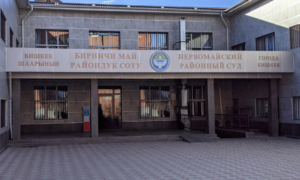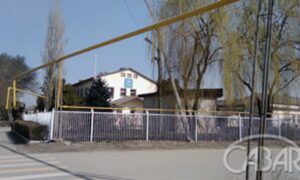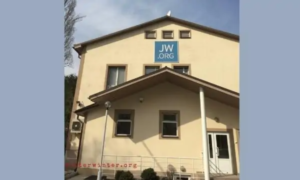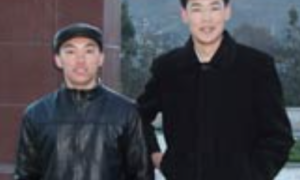On 28 October, the Supreme Court restored the three-year jail term for 36-year-old Muslim prisoner of conscience Asadullo Madraimov which a lower court had earlier halved. He has been jailed since October 2023 for criticising the authorities for closing Kara-Suu District’s Al-Sarakhsi Mosque. Police and NSC secret police raided Jehovah’s Witness worship meetings in two southern towns 8 days apart in August, insisting the meetings were “illegal”. Officials raided and closed down a Hare Krishna meeting in Bishkek in November and a Protestant conference in June, with summary fines for both.
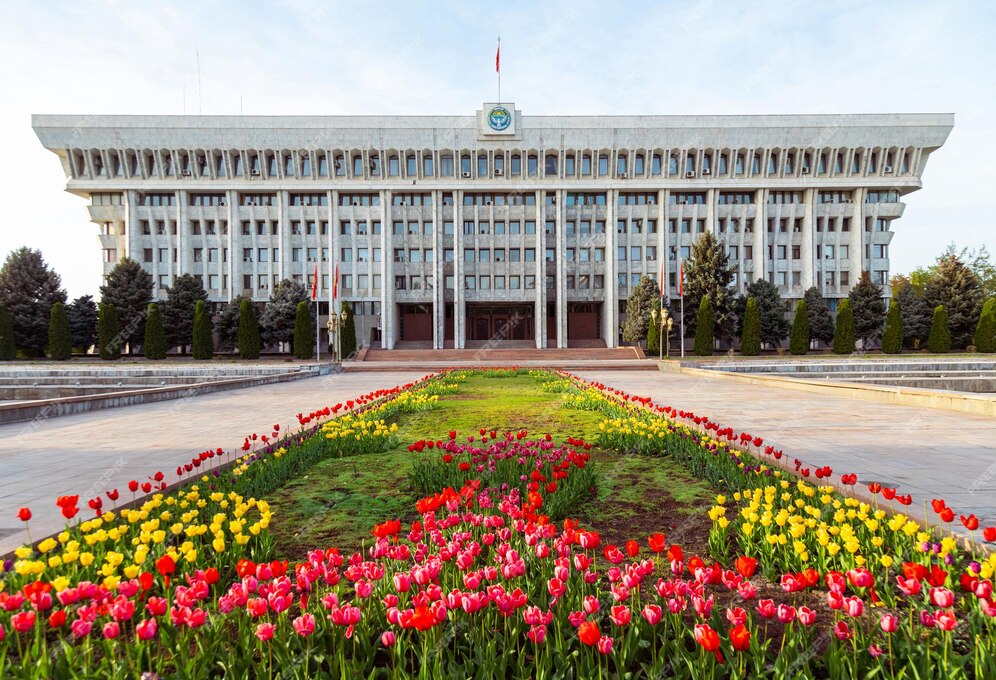
On 28 October, the Supreme Court in Bishkek restored the three-year jail term for 36-year-old Muslim prisoner of conscience Asadullo Madraimov. He has been in prison since his arrest on 18 October 2023 for criticising the authorities for the closure of his local Mosque, Kara-Suu District’s Al-Sarakhsi Mosque. Other Muslims – including Mamirzhan Tashmatov – were arrested with prisoner of conscience Madraimov. The arrests followed regime raids and closures of mosques and madrassahs in Osh Region in July and August 2023.
On 26 February 2024, prisoners of conscience Madraimov and Tashmatov were jailed for three years and two years respectively. At an appeal hearing on 13 May, their terms were reduced by half and Tashmatov was freed in the court room. However, Osh Regional Prosecutor’s Office lodged a cassation appeal to the Supreme Court where, on 28 October, a panel of three judges restored prisoner of conscience Madraimov’s original three year jail sentence (see below).
“I lodged the appeal because I believe the amnesty had been wrongly applied to Madraimov,” Prosecutor Botoyarov told Forum 18. “They approved my appeal. It’s now a legal decision. That’s it.” He claimed that prisoner of conscience Madraimov was not jailed because of his criticism of the regime’s closure of his mosque. “There were other issues,” he claimed, but refused to say what they were (see below).
On 10 August, ordinary police and National Security Committee (NSC) secret police raided a Jehovah’s Witness meeting for worship in Kyzyl-Kiya in the south-western Batken Region. Religious materials, including two Bibles and a laptop, were confiscated and would be sent for “expert analysis to see whether the materials contain extremist ideas”, regime officials told Jehovah’s Witnesses. Jehovah’s Witnesses told the officials that all the texts were imported with permission of the State Commission for Religious Affairs (SCRA), but they were still sent for “expert analysis” (see below).
All 16 Jehovah’s Witnesses were detained and questioned for six hours, Jehovah’s Witnesses told Forum 18. “The officer then took several Jehovah’s Witnesses to the nearest police station for further questioning. At the station they were once again questioned, personal photos were taken, and they were then released.” On 11 August, the day after the raid, regime-controlled news agencies stated that Jehovah’s Witnesses “who illegally met for preaching and reading religious books were detained by the police”. Jehovah’s Witnesses told Forum 18 that they think this was “done to scare the public” (see below).
Jehovah’s Witness communities, including in Batken Region, have been repeatedly denied state registration, despite the UN Human Rights Committee finding in two decisions so far that Kyrgyzstan violated the rights of Jehovah’s Witnesses by arbitrarily refusing to register their communities (see below).
On 18 August, a week after the Kyzyl-Kiya raid, the NSC secret police and ordinary police raided the home of a Jehovah’s Witness in Naryn in the southern Naryn Region where local believers were meeting for worship. The raiders filmed the meeting, stopped the worship, and told the worshippers that the meeting was “illegal”. Police took 10 of the 20 Jehovah’s Witnesses present at the meeting to a police station for questioning. Officers “told them that if they do not write statements they will open a criminal case against them”, Jehovah’s Witnesses told Forum 18. “So our believers were forced to testify against themselves” (see below).
Police showed the Jehovah’s Witnesses videos of the meeting, and demanded they reveal the names of those present. “When they refused, the officers threatened them with jail terms,” Jehovah’s Witnesses told Forum 18. “After their lawyer phoned the police they were released.” Later in August, Naryn police fined the host. Jehovah’s Witnesses appealed to Naryn City Court, which cancelled the fine on 24 September. The police appealed against this, but on 16 October Naryn Regional Court rejected the police appeal (see below).
Naryn City Police referred Forum 18 on 17 December to Saparbek Asanaliyev, head of Naryn Regional Police. He refused the same day to answer any questions on the raid, interrogations, and threats, and then put the phone down (see below).
Jehovah’s Witnesses told Forum 18 they are “deeply concerned” that the ordinary police and NSC secret police within eight days raided meetings for worship in both Kyzyl-Kiya and Naryn in different regions. They think that “these raids represent coordinated actions against our communities” (see below).
The Hare Krishna community in Bishkek is among the communities which have been repeatedly refused state registration. In November, the NSC secret police, ordinary police, and SCRA officials raided a public event with an international guest speaker arranged by members of Bishkek’s Hare Krishna community. The NSC secret police said that attendees were “lectured about cleansing of self-consciousness and psychological courses on self-improvement”. However, the NSC claimed, attendees “were not informed that the event is of a religious nature” (see below).
“The International Society for Krishna Consciousness, which is a sect, was involved in illegal religious activity,” the NSC secret police also claimed. The NSC said it is running “a campaign of operational-search measures to prevent illegally operating religious sects and organisations in the territory of Bishkek City.” In the course of this, it “identified and halted the illegal activity of the Hare Krishna community”. The SCRA and the ordinary police then drew up reports of an offence against 16 members of the Hare Krishna community, and each was fined two weeks’ average wages (see below).
“The NSC urges citizens to be on guard not to participate in commercial courses of such pseudo-psychologists in order to prevent the activity of sects,” the NSC secret police warned. The International Society for Krishna Consciousness told Forum 18 that they are “concerned about the situation of their local community without registration, their events being raided by the police, and their being branded by the government-sponsored media as sectarian and manipulative” (see below).
On 25 June, more than 100 young people from Protestant churches around Central Asia met for a conference at a resort on the shores of Lake Issyk-Kul in northern Kyrgyzstan. It appears that the ordinary police and the NSC secret police already knew from informers among the participants that the conference was taking place, Protestants told Forum 18. Also, regime officials had photos of the conference which some participants had apparently shared with them (see below).
Police arrived at the resort on 26 June with a document claiming that an “illegal” religious meeting was taking place. They detained five conference leaders, questioned and pressured them for nine hours, and demanded a list of names of everyone present. Conference participants called a lawyer, who arrived to support those being questioned. The leaders were forced to halt the conference (see below).
On 9 July, the NSC secret police announced on its website that its officers, together with police “Department for the Struggle against Extremism and Illegal Migration” officers, had “halted the religious-propaganda activity of adepts of the Word of God religious movement”. The NSC added that “during investigative and operational activities within the framework of registered materials of the pre-investigation inspection,” officers had detained three foreign citizens “who were engaged in illegal religious propaganda activities without accreditation from the SCRA”. Three leaders were fined two weeks’ average wages, and ordered deported. It remains unclear if they have been banned from re-entering Kyrgyzstan (see below).
SCRA Deputy Director Kanatbek Midin uuly and the NSC secret police have both declined to talk about the raids on Jehovah’s Witness, Hare Krishna, and Protestant events (see below).
“A very dangerous law”
On 12 December, the Zhogorku Kenesh (Parliament) in Bishkek gave first reading approval to two draft new laws increasing freedom of religion or belief restrictions. Among many other restrictions, the draft Religion Law makes it impossible for communities with fewer than 500 adult members to legally exist. Violations Code amendments sharply increase fines.
The new Laws could complete the second and third readings by the end of 2024.
“This is a very dangerous law,” a religious community leader who wished to remain anonymous for fear of state reprisals told Forum 18. “They seem to be in a rush, and this is alarming,” a human rights defender who wished to remain anonymous for fear of state reprisals told Forum 18.
Supreme Court reverses prison term reduction for Muslim criticising mosque closure
Muslim prisoner of conscience Asadullo Ibrakhimovich Madraimov (born 22 July 1988) has been in prison since officials arrested him on 18 October 2023 for criticising the authorities for the closure of his local Mosque, Kara-Suu District’s Al-Sarakhsi Mosque. Two other Muslims – including Mamirzhan Tashmatov – were arrested with prisoner of conscience Madraimov.
The arrests followed regime raids and closures of mosques and madrassahs in Osh Region in July and August 2023. The three members of the Al-Sarakhsi Mosque community who protested were arrested on criminal charges, and were held in Osh’s Investigation Prison from 18 October 2023. A Justice Ministry “expert analysis” claimed the men “discredited the authorities’ actions by saying that the ‘law-enforcement agencies interfered in mosque matters and acted against Muslims'”. One of the men’s fathers commented: “If we live in a democratic state, a person should not be criminally prosecuted for expressing their opinion.”
Prosecutor Maluda Ismailova of the District Prosecutor’s Office charged both men with violating Criminal Code Article 330, Part 1 (“Incitement of racial, ethnic, national, religious or inter-regional enmity (discord), as well as propaganda of the exclusivity, superiority or inferiority of citizens on the basis of their attitude to religion, nationality or race, committed publicly or with the use of the mass media as well as the internet”), and Criminal Code Article 278, Part 3 (“Calling for active disobedience of the lawful demands of state officials and for riots”).
The regime is increasingly using both Criminal Code articles to target human rights defenders and protestors against regime policies. In July 2023, a court jailed Protestant Aytbek Tynaliyev for 6 months for allegedly “inciting religious enmity” for social media posts sharing his faith and questioning the regime’s policy on freedom of religion or belief. Prosecutor Kaliya Rysbek kyzy refused to say how exactly Tynaliyev insulted Islam and why she called for a two-year jail term. The two Justice Ministry religious “experts”, who supported the prosecution case in court, would not explain why they considered Tynaliyev’s comments represented “disinformation about the religion of Islam”.
On 26 February 2024, Judge Syrgak Zhumadylov of Kara-Suu District Court jailed prisoners of conscience Madraimov and Tashmatov for three years and two years respectively for protesting against the regime’s closure of their mosque, the Al-Sarakhsi Mosque. Some mosques and madrassahs, though not the Al-Sarakhsi Mosque, are known to be still closed. Judge Zhumadylov refused to explain why he jailed the two prisoners of conscience. “I will not give any comments on my verdict, which has not entered into force,” he told Forum 18 on 26 March. “It is illegal for me to do so at the moment,” he added, without indicating which law banned him from explaining his verdict.
Judge Zhumadylov dropped the charges under Criminal Code Article 278, Part 3, but maintained the Criminal Code Article 330, Part 1 charges. An appeal against the two men’s jailing was filed on 27 March by their defence lawyer while the two prisoners of conscience remained in Osh’s Investigation Prison.
On 13 May 2024, Osh Regional Court heard Madraimov and Tashmatov’s appeal against their convictions and jail terms. Appeal Board Judges Mirlan Borombayev, who is also Chair of the Court, and Azizbek Dosmambetov reduced the men’s prison terms by half, their lawyer Khusanbai Saliyev told Forum 18 in June. Tashmatov was freed in the court room on 13 May, since he had served his full sentence. Madraimov was transferred to a normal prison, from which he was expected to be released by 25 August, his lawyer Saliyev explained.
Prisoner of conscience Madraimov’s original three year jail sentence restored
Maratbek Botoyarov of Osh Regional Prosecutor’s Office lodged a cassation appeal to the Supreme Court. On 28 October, a panel of three Supreme Court judges in Bishkek – Nurlan Musayev, Inara Gilyazetdinova, and Nurlanbek Atanazarov – upheld Prosecutor Botoyarov’s appeal. Daniyar Keldibayev of the General Prosecutor’s Office supported Botoyarov’s appeal at the hearing. The decision – seen by Forum 18 – restored prisoner of conscience Madraimov’s original three year jail sentence.
“I lodged the appeal because I believe the amnesty had been wrongly applied to Madraimov,” Prosecutor Botoyarov told Forum 18 from Osh on 17 December. “They approved my appeal. It’s now a legal decision. That’s it.”
Prosecutor Botoyarov claimed that prisoner of conscience Madraimov was not jailed because of his criticism of the regime’s closure of his mosque. “There were other issues,” he claimed, but refused to say what they were. Botoyarov also refused to say when prisoner of conscience Madraimov is now due to be freed.
Prosecutor Keldibayev refused to explain to Forum 18 on 18 December why he had supported Prosecutor Botoyarov’s appeal.
Supreme Court Judge Musayev claimed that the alleged “guilt of the convicted Madraimov” under Criminal Code Article 330, Part 1 (“Incitement of racial, ethnic, national, religious or inter-regional enmity (discord), as well as propaganda of the exclusivity, superiority or inferiority of citizens on the basis of their attitude to religion, nationality or race, committed publicly or with the use of the mass media as well as the internet”) “was established”. The Judge claimed this was due to “screenshots from Madraimov’s personal [social media] page, conclusions of the forensic linguistic and linguistic comprehensive examination, and conclusions of the forensic linguistic and religious comprehensive examinations from 26 October 2023, 20 October 2023 and 23 November 2023.”
SCRA Deputy Director Kanatbek Midin uuly, told Forum 18 on 17 December that he could not comment on the case as he was in the Zhogorku Kenesh (Parliament) for hearings on the draft new Religion Law and Amending Law. “I do not have the details to hand,” he told Forum 18.
Kyzyl-Kiya: Jehovah’s Witness meeting for worship raided, religious materials confiscated
On 10 August, ordinary police and National Security Committee (NSC) secret police raided a Jehovah’s Witness meeting for worship in Kyzyl-Kiya in the south-western Batken Region.
Religious materials, including two Bibles and a laptop, were confiscated and would be sent for “expert analysis to see whether the materials contain extremist ideas,” the regime officials told Jehovah’s Witnesses. The officials were told by the Jehovah’s Witnesses that all the imported texts were imported with the permission of the State Commission for Religious Affairs (SCRA).
Officers detained all 16 Jehovah’s Witnesses and questioned them for six hours, Jehovah’s Witnesses told Forum 18. “The officer then took several Jehovah’s Witnesses to the nearest police station for further questioning. At the station they were once again questioned, personal photos were taken, and they were then released.”
On 11 August, the day after the raid, regime-controlled news agencies stated that Jehovah’s Witnesses “who illegally met for preaching and reading religious books were detained by the police”. Jehovah’s Witnesses told Forum 18 that they think this was “done to scare the public”.
Jehovah’s Witness communities, including in Batken Region, have been repeatedly denied state registration and so permission to exist, as have other communities. Such denials have “a chilling effect”, Jehovah’s Witnesses note. They took their cases to the UN Human Rights Committee, which in two decisions so far have found that Kyrgyzstan violated the rights of Jehovah’s Witnesses by arbitrarily refusing to register their communities.
On 15 August, Jehovah’s Witnesses gave police copies of the SCRA import permits for each of the seized books. Despite this, on 17 August Kyzyl-Kiya Police sent the books, including the Bibles, to the SCRA for “expert analysis”.
The Kyzyl-Kiya Police duty officer, who refused to give his name, refused on 17 December to explain why the meeting for worship was raided, why worshippers were questioned over several hours, why regime media published hostile reports on the raid, and why confiscated texts imported with SCRA permission were sent for SCRA “expert analysis”.
An NSC secret police spokesperson in Bishkek, who gave his name as Kulish, did not reply to Forum 18’s question by the end of the working day in Bishkek of 18 December as to why the NSC raided the Jehovah’s Witness meeting for worship in Kyzyl-Kiya.
SCRA Deputy Director Kanatbek Midin uuly, told Forum 18 on 17 December that he could not comment on the case as he was in the Zhogorku Kenesh for hearings on the draft new Religion Law and Amending Law. “I do not have the details to hand,” he told Forum 18.
Naryn: Jehovah’s Witness meeting for worship raided, host initially fined
On 18 August, a week after the Kyzyl-Kiya raid, the NSC secret police and police raided the home of a Jehovah’s Witness in Naryn in the southern Naryn Region where local believers were meeting for worship. The raiders filmed the meeting, stopped the worship, and told the worshippers that the meeting was “illegal”.
The unregistered exercise of freedom of religion or belief is illegal, against the regime’s legally-binding international human rights obligations. Officials have rejected all attempts to register Jehovah’s Witness communities in Naryn Region except one. Officials continue to ignore rulings by the UN Human Rights Committee, which in two decisions so far has found that Kyrgyzstan violated the rights of Jehovah’s Witnesses by arbitrarily refusing to register their communities.
Police took 10 of the 20 Jehovah’s Witnesses present at the meeting to a police station for questioning, and “told them that if they do not write statements they will open a criminal case against them”, Jehovah’s Witnesses told Forum 18. “So our believers were forced to testify against themselves.”
Police showed the Jehovah’s Witnesses videos of the meeting, and demanded they reveal the names of those present. “When they refused, the officers threatened them with jail terms,” local Jehovah’s Witnesses told Forum 18. “After their lawyer phoned the police were they released.” Officials then instructed the Jehovah’s Witnesses to return to the police station on 30 August with their lawyer.
On 19 August, the day after the raid, the host of the meeting went to Naryn Region SCRA officials to take responsibility for the meeting so that fellow-believers would not be punished. SCRA officials told the host that police had already prepared punishments against them under the Violations Code based on the signed statements police had forced the Jehovah’s Witnesses to write. Violations Code Article 142 allows the police and the SCRA to issue summary fines.
Later in August, Naryn police fined the host more than 200 Financial Indicators (six weeks’ average wage) under the Violations Code. Jehovah’s Witnesses appealed to Naryn City Court, which cancelled the fine on 24 September. The police appealed against this, but on 16 October Naryn Regional Court rejected the police appeal.
Naryn City Police referred Forum 18 on 17 December to Saparbek Asanaliyev, head of Naryn Regional Police. He refused the same day to answer any questions on the raid, interrogations, and threats, and then put the phone down.
An NSC secret police spokesperson in Bishkek, who gave his name as Kulish, did not reply to Forum 18’s question by the end of the working day in Bishkek of 18 December as to why the NSC raided the Jehovah’s Witness meeting for worship in Naryn.
SCRA Deputy Director Kanatbek Midin uuly, told Forum 18 on 17 December that he could not comment on the case as he was in the Zhogorku Kenesh (Parliament) for hearings on the draft new Religion Law and Amending Law. “I do not have the details to hand,” he told Forum 18.
Raids part of wider campaign against Jehovah’s Witnesses?
Jehovah’s Witnesses told Forum 18 that they are “deeply concerned” that the ordinary police and NSC secret police within eight days raided meetings for worship in both Kyzyl-Kiya and Naryn in different regions. They think that “these raids represent coordinated actions against our communities”.
Criminal case against Jehovah’s Witnesses still open?
NSC secret police chief Kamchybek Tashiyev was a driving force behind an attempt to ban the Jehovah’s Witness community. He claimed to the General Prosecutor’s Office in July 2021, without giving evidence, that Jehovah’s Witnesses “at various times and in various countries have been accused of rape, child kidnapping, murder, incitement to murder and suicide, desertion, fraud, theft, racism, extortion, bodily harm, prostitution, etc”.
Related to that attempt, on 4 December 2019 the NSC secret police opened a criminal case against so far unspecified members of the Jehovah’s Witness national centre in Bishkek under Article 313, Part 2, Point 2 of the Criminal Code then in force. This punishes “Incitement of racial, ethnic, national, religious or inter-regional enmity (discord) conducted by a group of people in a prior conspiracy” with jail terms.
Article 313 of the old Criminal Code is similar to Article 330 of the new Criminal Code which came into force on 1 December 2021. Any trial would take place under the provisions in force at the time the “crime” was committed.
No individual defendants are reportedly named as part of the criminal case. Jehovah’s Witnesses fear that any guilty verdict would have wider consequences. “A guilty verdict would likely lead to closing the centre, dissolving its activities, likely confiscating its assets, and subsequent prosecutions and imprisonment of anyone who was deemed to be continuing those activities,” they told Forum 18 in November 2021.
The NSC officer investigating the criminal case, Lieutenant Kubanychbek Toktaliyev, refused to give Forum 18 any information about the case on 17 December 2021, citing the “secrecy of the investigation”. When Forum 18 asked why Jehovah’s Witnesses should live under threat of arrest on serious criminal charges for more than two years, he replied: “I’m not threatening anyone.”
Jehovah’s Witnesses told Forum 18 on 16 December 2024 that the “investigation remains open, but details of its progress have not been disclosed to us”.
Forum 18 could not reach anyone at the General Prosecutor’s Office in Bishkek on 17 or 18 December. The telephone at the NSC secret police used in 2021 by investigator Lieutenant Toktaliyev went unanswered on 17 and 18 December.
An NSC secret police spokesperson in Bishkek, who gave his name as Kulish, did not reply to Forum 18’s question by the end of the working day in Bishkek of 18 December as to whether the criminal case is still open, and if so why.
SCRA Deputy Director Kanatbek Midin uuly, told Forum 18 on 17 December that he could not comment on the case as he was in the Zhogorku Kenesh (Parliament) for hearings on the draft new Religion Law and Amending Law. “I do not have the details to hand,” he told Forum 18.
Bishkek: Public Hare Krishna event raided
The Hare Krishna community in Bishkek is among the communities which have been repeatedly refused state registration. On 11 June 2023, Interior Ministry and police “Department for the Struggle against Extremism and Illegal Migration” officials, as well as SCRA officials, raided the wedding rehearsal of a Hare Krishna couple. The wedding rehearsal was taking place in the flat of another Hare Krishna devotee. The devotee was fined 7,500 Soms (two weeks’ average wages) and Indian students present had their student visas cancelled.
The Interior Ministry and police “Departments for the Struggle against Extremism and Illegal Migration,” the SCRA, and the NSC secret police all refused to explain to Forum 18 why the regime is violating its legally-binding international human rights obligations.
In November 2024, the NSC secret police, the ordinary police, and SCRA officials raided a public event with an international guest speaker arranged by members of the Hare Krishna community in Bishkek. The NSC secret police said on its Instagram page on 13 December that about 300 participants were invited to the event in a Bishkek hotel. There they were “lectured about cleansing of self-consciousness and psychological courses on self-improvement.” However, the NSC claimed, attendees “were not informed that the event is of a religious nature.”
The NSC secret police claimed that, during the event, the speaker “actively used methods of psychological impact such as hypnosis and manipulation as well as individual and collective meditation, singing of mantras and other hidden religious rituals.”
Hare Krishna books, including the “Bhagavad-Gita As It Is”, were available at the meeting. This is a translation of and commentary on the ancient Sanskrit text the Bhagavad-Gita by Swami Prabhupada, founder of the International Society for Krishna Consciousness.
“The International Society for Krishna Consciousness, which is a sect, was involved in illegal religious activity,” the NSC secret police also claimed, stating that the NSC is running: “a campaign of operational-search measures to prevent illegally operating religious sects and organisations in the territory of Bishkek City.” In the course of this, it “identified and halted the illegal activity of the Hare Krishna community.”
The SCRA and the ordinary police then drew up reports of an offence against 16 members of the Hare Krishna community. Each of them was fined 75 Financial Indicators, 7,500 Soms under Violations Code Article 142, which punishes violations of the Religion Law. This represents two weeks’ average wage. Violations Code Article 142 allows the police and the SCRA to issue summary fines.
“The NSC urges citizens to be on guard not to participate in commercial courses of such pseudo-psychologists in order to prevent the activity of sects,” it warned.
Many local news agencies reproduced the NSC secret police account from its Instagram page.
The International Society for Krishna Consciousness told Forum 18 on 13 December that they are “concerned about the situation of their local community without registration, their events being raided by the police, and their being branded by the government-sponsored media as sectarian and manipulative.”
An NSC secret police spokesperson in Bishkek, who gave his name as Kulish, did not reply to Forum 18’s question by the end of the working day in Bishkek of 18 December as to why the NSC raided the meeting in Bishkek, and describes the Hare Krishna community as among “illegally operating religious sects”.
SCRA Deputy Director Kanatbek Midin uuly, told Forum 18 on 17 December that he could not comment on the case as he was in the Zhogorku Kenesh (Parliament) for hearings on the draft new Religion Law and Amending Law. “I do not have the details to hand,” he told Forum 18.
Issyk-Kul: Protestant conference raided, 3 fined and ordered deported
On 25 June, more than 100 young people from Protestant churches around Central Asia met for a conference at the Welcome Home resort on the shores of Lake Issyk-Kul in northern Kyrgyzstan.
It appears that the ordinary police and the NSC secret police already knew from informers among the participants that the conference was taking place, Protestants told Forum 18. Regime officials had photos of the conference which some participants had apparently shared with them, Protestants told Forum 18.
Police arrived at the resort on 26 June with a document claiming that an “illegal” religious meeting was taking place. They detained five conference leaders, questioned and pressured them for nine hours, and demanded a list of names of everyone present. Conference participants called a lawyer, who arrived to support those being questioned. The leaders were forced to halt the conference.
On 9 July, the NSC secret police announced on its website that its officers, together with police “Department for the Struggle against Extremism and Illegal Migration” officers, had “halted the religious-propaganda activity of adepts of the Word of God religious movement”. The NSC added that “during investigative and operational activities within the framework of registered materials of the pre-investigation inspection,” officers had detained three foreign citizens “who were engaged in illegal religious propaganda activities without accreditation from the SCRA”.
Police issued summary fines of 75 Financial Indicators, 7,500 Soms (two weeks’ average wage), to each of the three leaders under Violations Code Article 142, Part 4 (“Carrying out religious activity without registration at the executive state body for religious affairs”). Violations Code Article 142 allows the police and the SCRA to issue summary fines.
Police also ordered three of the leaders to be deported. It remains unclear if they have been banned from re-entering Kyrgyzstan.
An NSC secret police spokesperson in Bishkek, who gave his name as Kulish, did not reply to Forum 18’s question by the end of the working day in Bishkek of 18 December as to why the NSC raided the conference.
SCRA Deputy Director Kanatbek Midin uuly, told Forum 18 on 17 December that he could not comment on the case as he was in the Zhogorku Kenesh (Parliament) for hearings on the draft new Religion Law and Amending Law. “I do not have the details to hand,” he told Forum 18. (END)
